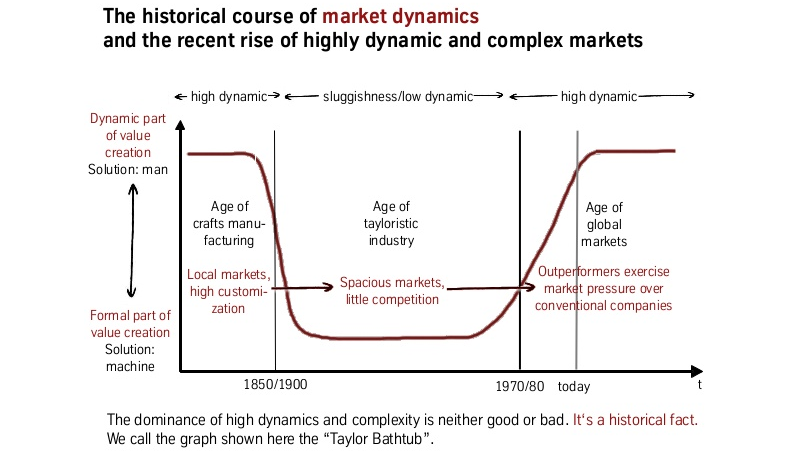
Organize for Complexity is a book about complexity and work with a condensed introduction to the theory and practice of organizational high performance.
Summary
Title: Organize for Complexity: How to Get Life Back Into Work to Build the High-Performance Organization
Author: Niels Pflaeging
Themes: Agile, Organization Performance, Technology, Management, Business
Year: 2014
Publisher: Nielspflaeging
ISBN: 0991537602, 9780991537600
Pages: 142
As a book about complexity and work, it provides an introduction to the theory and practice of organizational high performance, or even as a manifesto for contemporary leadership and profound organizational transformation.
In this book, Theory Y and globalization are used to highlight contemporary leadership and management practices.
For anyone who wants to build high-performance organizations without bureaucracy or command-and-control structures, this book is a must-read.
It's written to explain its ideas in a simple way, full of illustrations.
Introducing unconformity without intending to be deep.
The article about The Taylor Bathtub and Management Changes came from this book's ideas. During the twentieth century, Taylor's scientific management was the basis for management.

Niels Pflaeging argues, however, that over time, the simplicity of this model in organizations compensated for the social gaps with hierarchical divisions, the functional gaps with fragmented responsibilities, and the time gaps between thinkers and nonthinkers.
As the graph shows the historical trajectory of market dynamics and the recent growth of complex markets, it is referred to by Niels Pflaeging as the "Taylor Bathtub."
Niels calls the "old management" system Alpha, where the control comes from bosses.
Design principle Beta - following the work: Teams are multi-functional, interdisciplinary, or functionally integrated.
Design principle Alpha - following functions: Groups are uni-functional, or functionally differentiated.

Creating an environment conducive to success is the focus of this slim and engaging book. Business owners, managers, change agents, and consultants, as well as professionals of all kinds, will find the book insightful.
My Book Highlights:
"... Design principle Beta - following the work: Teams are multi-functional, interdisciplinary, or functionally integrated..."
"... Design principle Alpha - following functions: Groups are uni-functional, or functionally differentiated..."
"... Complicated systems operate in standardized ways. In complicated systems, imprecision is diminished and nonobjectivity and uncertainty are reduced as far as possible. Such a system can be described through non-ambiguous cause-and-effect chains. It is externally controllable. Complex systems produce surprises. They have the presence or participation of living creatures. They are living systems - that’s why they may change at any moment. Such systems are only externally observable – not controllable. A complex system´s behavior is non-predictable. In a complex system, it’s natural that there is a level of error, uncertainty, and illusion that is much higher than in complicated systems. A complex system may possess elements that can operate in standardized ways, but their interaction would be constantly changing, in discontinuous ways..."
"... The only “thing” capable of dealing effectively with complexity is human beings..."
"... In complexity, the question isn’t how to solve a problem, but who can do it. What matters now is skillful people or people with mastery or prowess..."
"... Working on individual parts of the system does not improve the functioning of the whole: in a system, it is not so much the parts that matter, but their fit..."
"... We cannot act on systems, leadership, performance, or change coherently if we don´t agree beforehand on the assumptions we hold about human nature..."
"... In complexity, diversity in motivations and preferences can be an asset, or a liability, depending on the level of self-reflection present..."
"... Teams are multi-functional, interdisciplinary, or functionally integrated. Diverse individuals who work in an interconnected fashion, with each other and for each other - individuals who commit to work together to reach a common goal..."
"... Culture is not a success factor, but an effect of success or failure. It is an image of the circumstances in an organization, not their cause. That is why it also cannot be influenced directly. Culture is like a shadow..."
"... By the way: an organization cannot fully know itself. Therefore, a self-description can only be developed with outside help..."
"... Culture is like a shadow. You cannot change it, but it changes all the time. Culture is read-only..."
"... The difference between rules and principles is that for setting up rules, you need to analyze every possible situation before formulating them. Rules are based on the pattern of if-this-happens-do-that..."
"... Principles are like guidelines that help you test whether your actions are aligned with your beliefs and values, or not. If not, you have to search for another way to solve..."
How can we adjust a growing organization, without falling into the bureaucracy trap?
How can my organization deal with growing complexity?
How can we become more capable of adapting to new circumstances?
How can we overcome existing barriers to performance, innovation, and growth?
How can my firm achieve higher engagement and become an organization fitter for human beings overall?
How can we produce profound change, without hitting a wall?
In order to address these issues, the book argues that we need to build and sustain organizations that are truly robust and fit for humans.
In this book, an alternative approach to managing teams and companies is described.
The book suggests that the key to managing complexity is to develop a more dynamic and responsive organizational structure, which is less hierarchical and more networked.
It also suggests that organizations should focus on building "relational intelligence" as a way to better understand and navigate complexity.
The book is intended for managers, leaders, and anyone else interested in managing complex systems in organizations.
Chapters of the Book:
Part 1 - Complexity: why it matters to work and organizations
Part 2 - Humans at Work: the secret ingredient
Part 3 - Self-organizing teams and the networked organization
Part 4 - Organizations as systems: designing for complexity
Part 5 - Dynamic-robust networks for all: this is how you pull it off
Part 6 - Leadership in complexity: what remains of it, and what is needed
Part 7 - Transform, or stay stuck: the way forward
In summary, the book provides a new perspective on the complexity of organizations and systems, and it suggests a new approach to organizing and managing them based on the idea that complex systems are composed of many interacting parts and that effective management requires continuous adaptation to changing circumstances.
The book emphasizes the importance of developing a more dynamic and responsive organizational structure, which is less hierarchical and more networked and focuses on building "relational intelligence" as a way to better understand and navigate complexity.
Niels Pflaeging is one of the world's foremost authorities on organizational leadership, decentralization, self-organization, and democracy. Niels has published 10 books and many articles on the mentioned themes, including the international best-seller "Organize for Complexity".
I am incredibly grateful that you have taken the time to read this post.
Your support and engagement mean the world to me, and I truly appreciate your interest in the topics I write about.
I hope that you have found this post informative, educational and engaging.
If you are interested in reading more of my work, please visit other articles here on the website.
I promise to continue providing valuable and high-quality content for your enjoyment and education.
Thank you again for reading and I hope to see you soon!
Here are some related articles you may enjoy:
There are even more good things I've prepared for you!
Subscribe here to receive new posts in your Email!
Do you want to read some book notes and recommendations? Discover more here!
Do you want to have amazing weekly content curation? Discover more here!
Ready to make a positive impact?
Support my work by sharing my content with your network.
Your simple act of kindness can reach new heights and help spread valuable information.
Want to show your support in a tangible way? A virtual coffee is a small but mighty way to show your appreciation and give me the extra energy to keep crafting valuable content!



